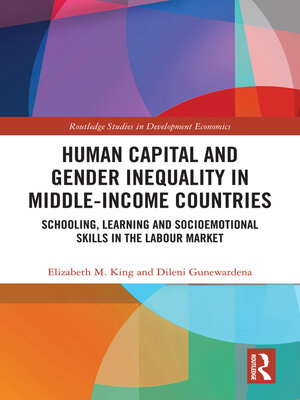Human Capital and Gender Inequality in Middle-Income Countries
ebook ∣ Schooling, Learning and Socioemotional Skills in the Labour Market · Routledge Studies in Development Economics
By Elizabeth M. King

Sign up to save your library
With an OverDrive account, you can save your favorite libraries for at-a-glance information about availability. Find out more about OverDrive accounts.
Find this title in Libby, the library reading app by OverDrive.



Search for a digital library with this title
Title found at these libraries:
| Library Name | Distance |
|---|---|
| Loading... |
The role of cognitive and socioemotional skills alongside education in determining people's success in the labour market has been the topic of a growing body of research - but previous studies have mostly missed middle-income countries and the developing world because measures of those skills and data on employment and earnings on large enough samples of adults have typically not been available.
Using comparable survey data on these schooling, skills and labour market outcomes from 13 developing and emerging economies worldwide, this book revisits human capital and gender inequality models. It presents new estimates of the returns to different levels of schooling as well as cognitive and socioemotional skills for women and men. It examines whether those returns are due to levels of human capital or to structural bias in labour markets, and how these two factors work across the earnings spectrum. The book examines the existence of 'glass ceilings' and 'sticky floors' for women using this expanded measure of human capital. Further, by analyzing a group of countries of wide-ranging levels of economic development and socio-political contexts, the book reveals patterns and insights into how context mediates the relationship between skills and gender gaps in labour market outcomes.
This book will be of interest to scholars of human capital and gender inequality in the labour market and development economics, as well as gender and development policy makers.







